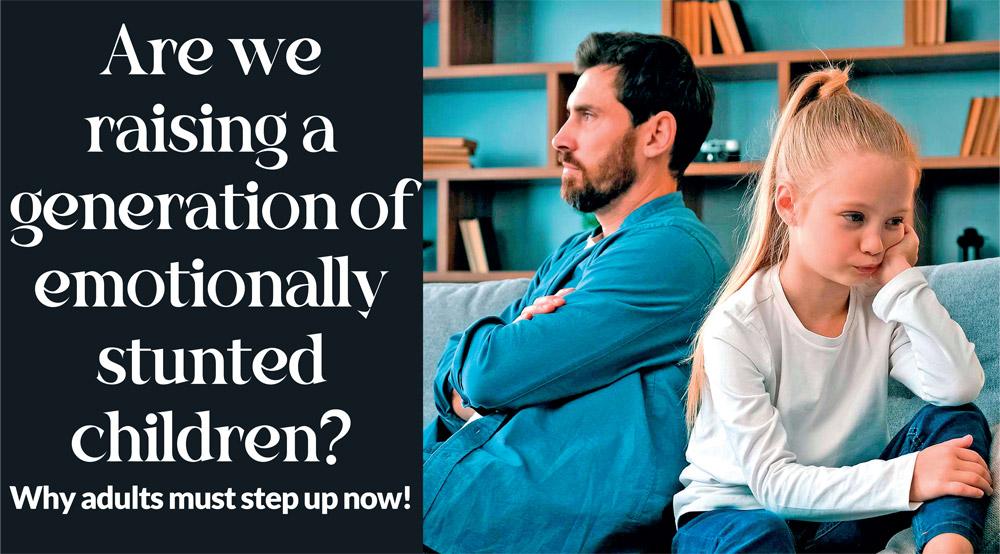

|
|
Being an educator is often times like being the proverbial “old woman who lived in a shoe”, and the temptation to “whip them (the kids) all soundly” is extremely tempting. This statement may appear horrifying and taboo in the context of the Convention on the Rights of the Child. However, in today’s society of overprotective parents who have too much praise for matter-of- fact actions, and who do not hold children accountable let alone punish them for their wrong doings, there are moments when an old-fashioned whack or two feels like the answer to helping teenagers get over their emotional immaturity.
How can you tell if your teenager is emotionally stunted?
Do they overreact and get unnecessarily angry over small, irrelevant matters? Do they assume that the world revolves around them and get upset when they don’t get their own way? Do they have a sense of entitlement and expect to be made to feel special? If some of the above resonate with you, your child may well be displaying signs of emotional immaturity.
Why is this an issue?
 For starters, emotional immaturity can negatively affect personal and professional relationships as the lack of sensitivity to circumstances can lead others to portray you as fake, insensitive, rude, and even downright disrespectful. Emotional immaturity can also adversely affect personal and professional growth and development as a result of not understanding your own shortcomings and ignorantly believing that one’s behaviour is socially acceptable. All in all, being emotionally stunted is a recipe for disaster if one expects to have a happy, stable, and fulfilling life.
For starters, emotional immaturity can negatively affect personal and professional relationships as the lack of sensitivity to circumstances can lead others to portray you as fake, insensitive, rude, and even downright disrespectful. Emotional immaturity can also adversely affect personal and professional growth and development as a result of not understanding your own shortcomings and ignorantly believing that one’s behaviour is socially acceptable. All in all, being emotionally stunted is a recipe for disaster if one expects to have a happy, stable, and fulfilling life.
Being spoiled as a child
As parents, it can be tempting to give in to your child’s every demand. We want to see them happy, avoid tantrums, and sometimes, we’re just too exhausted to argue. But constantly saying yes does more harm than good. By agreeing to everything your child wants, you are subconsciously training them to expect that the answer will always be yes. The problem arises when they eventually encounter a no, be it from a teacher, a friend, or later in life, an employer; they don’t know how to handle it. Children thrive when they have clear, consistent boundaries. While they may push back against them, these boundaries provide a sense of security. They help children understand right from wrong, develop self-discipline, and build emotional resilience. Without limits, kids may struggle to cope with disappointment or frustration, leading to difficulties in relationships and professional settings as they grow. As a parent, it is vital to say no. Setting limits teaches kids valuable life skills, including patience, responsibility, and the ability to handle setbacks. When needed, don’t hesitate to confiscate devices, enforce grounding, or establish clear consequences for misbehaviour.
These actions are not about being overly strict but about preparing your child for the real world, where they will not always get what they want.
Avoidance of adversity and failure
 Children who grow up without developing resilience often exhibit emotional immaturity. Without prior exposure to hardship, even minor setbacks can feel overwhelming. Teenagers who have always had their hand held, relying on parental intervention in every conflict situation, grow up lacking self-esteem. Consequently, they doubt their own abilities, and in a proverbial “vicious cycle”, continue to run away from challenging social interactions. Overprotective parenting, while driven by love and concern, ultimately tends to leave children ill-equipped to handle life’s inevitable challenges. Instead of shielding children from difficulties, parents should focus on preparing them for it; helping them build the emotional strength they need to thrive in an unpredictable world. Parents need to provide children with the opportunity to work through their problems (and I’m not talking of math problems in a textbook!), teach them to take small, calculated risks, and experience failure in a safe environment. It is important to let children navigate difficult situations, whether it’s a tough conversation with a friend, struggling with a difficult task at school, or experiencing disappointment in a sport or hobby. Sadly, instead of helping children understand that they are sometimes just not fast enough to win a race, today’s parents try to counteract their children’s disappointment by demanding participation certificates or falsely accusing the referees of favouritism!
Children who grow up without developing resilience often exhibit emotional immaturity. Without prior exposure to hardship, even minor setbacks can feel overwhelming. Teenagers who have always had their hand held, relying on parental intervention in every conflict situation, grow up lacking self-esteem. Consequently, they doubt their own abilities, and in a proverbial “vicious cycle”, continue to run away from challenging social interactions. Overprotective parenting, while driven by love and concern, ultimately tends to leave children ill-equipped to handle life’s inevitable challenges. Instead of shielding children from difficulties, parents should focus on preparing them for it; helping them build the emotional strength they need to thrive in an unpredictable world. Parents need to provide children with the opportunity to work through their problems (and I’m not talking of math problems in a textbook!), teach them to take small, calculated risks, and experience failure in a safe environment. It is important to let children navigate difficult situations, whether it’s a tough conversation with a friend, struggling with a difficult task at school, or experiencing disappointment in a sport or hobby. Sadly, instead of helping children understand that they are sometimes just not fast enough to win a race, today’s parents try to counteract their children’s disappointment by demanding participation certificates or falsely accusing the referees of favouritism!
Subconscious learning
Children are mirrors of their parents’ emotional habits. According to Bandura’s Social Learning Theory, children absorb and subsequently imitate how parents act. When parents throw tantrums over minor inconveniences, sulk when they don’t get their way, or lash out at the world for every setback, what lesson are they imparting? That emotional instability is normal, and that entitlement trumps resilience. Children who witness such behaviour internalise fragility. Teenagers who observe a parent constantly blaming others for every failure, learn deflection instead of accountability. Those who witness constant emotional outbursts, equate frustration with aggression. Parents who want emotionally strong children must first check their own emotional maturity. It is not enough to tell children to be strong. Parents need to model resilient behaviour, and this starts with owning your own setbacks rather than blaming others, regulating one’s emotions, and demonstrating perseverance when life gets tough. Furthermore, we must teach children to act from integrity which requires us as parents and educators to model accountability, demonstrating through our actions that challenges are best met with resilience rather than resentment. In other words, if we want emotionally resilient kids, we need to stop acting like emotional toddlers ourselves.
Lack of self-awareness
Teenagers who lack self-awareness struggle to process emotions in a healthy manner, often succumbing to sadness, anxiety, or anger. Emotional intelligence, which forms the basis of every deep and meaningful relationship, be it personal or professional, requires understanding one’s own emotions and those of others. When self-awareness is absent, relationships remain shallow and unfulfilling. This can be observed within the victim mentality some children adopt where they learn to shift responsibility onto others—parents, teachers, peers, and even society at large.
Their first instinct, when things go wrong, is not to assess their own actions but to point fingers. Unless “nipped in the bud”, this leads to the avoidance of responsibility, and consequently dissatisfaction from the inability to create meaningful relationships. Children must be encouraged to quiet their complaints, face their problems head-on, and engage in difficult conversations rather than avoiding them in order to develop their self- awareness. As parents we need to stop wanting to live through our children and instead be ready to understand
their hopes and dreams and support them to be the best version of themselves. Children need to be allowed to gain a clear understanding of who they are and what they wish to achieve for themselves and others. It is only when they understand this that they will be ready to confront difficult emotions and embrace discomfort as a necessary part of the journey of self-development. Children who learn this invaluable life lesson will learn emotional discipline – rather than constantly suppressing their emotions without reflecting on themselves, they will learn to understand emotions and channel them productively.
A Call to Action for Parents and Society!
The emotional well-being of our children is not something that can be left to chance. As parents, educators, and mentors, we must recognize that overprotection, indulgence, and avoidance of discomfort do not serve children in the long run. Instead, we must equip them with the tools necessary to navigate the complexities of life; self-awareness, emotional intelligence, resilience, and accountability. Raising a generation of emotionally mature individuals requires us to step up and model the behaviours we wish to see in them. It has become natural for children to be perplexed by social nuances as they neither have the emotional capacity to understand nor deal with them. Rather than accepting it as fact, we must actively work to better the younger generation. It means setting boundaries, allowing children to experience failure, and teaching them to process emotions constructively rather than running from them. No one said parenting was easy – if truth be told, it may in fact be exhausting. But having taken the decision to become a parent, it then behoves you to be the best possible parent that it is within your power to be. The world does not need more emotionally fragile individuals who crumble at the first sign of adversity. It needs strong, compassionate, and self-aware individuals who can navigate relationships, conflicts, and challenges with maturity. That transformation begins at home; with you.


 There was an old woman who lived in a shoe.
There was an old woman who lived in a shoe.








